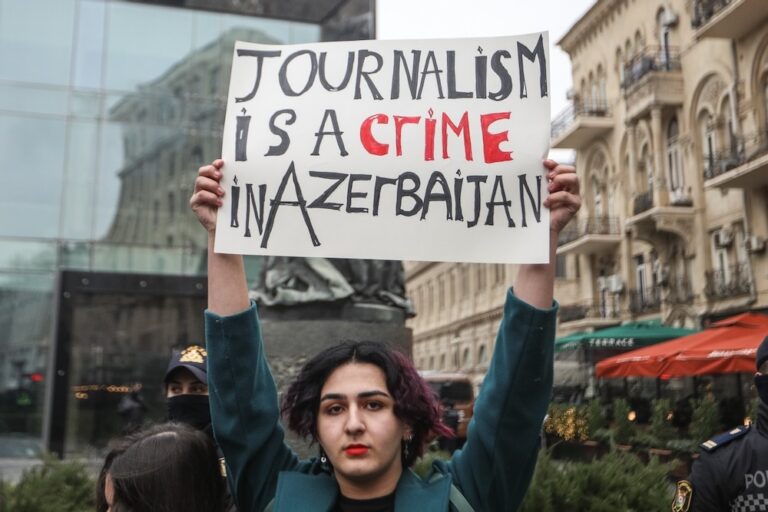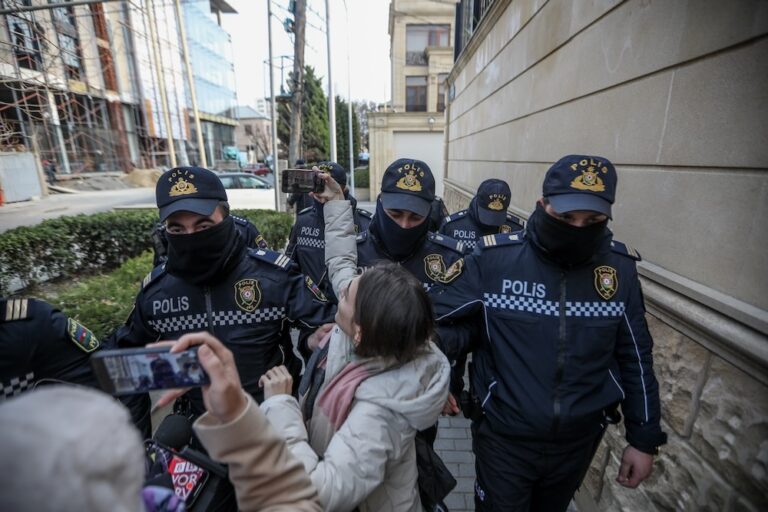In honour of the International Day of Human Rights, IRFS regrets that the country continues to imprison journalists and restrict citizens' right to information.
(IRFS/IFEX) – 11 December 2010 – The Institute for Reporters’ Freedom and Safety (IRFS) condemns the Azerbaijani government’s defiance of the International Day of Human Rights and the continuing threats against human rights and liberties in Azerbaijan, particularly freedom of speech.
The UN General Assembly adopted the Universal Declaration of Human Rights in 1948. This document sets out the international standards for upholding human rights, and outlines the fundamental principles upon which all binding international agreements are based. In his appeal, UN Secretary General Ban Ki Moon called on every citizen to protect human rights.
IRFS expresses profound regret that the leadership of Azerbaijan, a country which continually features prominently in international reports on human rights violations, has once again ignored the International Day of Human Rights. There were no official statements released, nor were the internationally recognized prisoners of conscience released.
IRFS would like to draw particular attention to the case of imprisoned journalist Eynulla Fatullayev, the former editor-in-chief of Daily Azerbaijan and Real Azerbaijan newspapers, who remains behind bars despite the European Court of Human Rights ruling for his immediate release.
IRFS would like to remind readers that the Azerbaijani government banned the broadcasts of Radio Liberty, BBC and VOA via FM frequencies back in January 2009, a move which has deprived Azerbaijan’s population of its right to obtain accurate information through electronic mass media.
Although five years have passed since the murder of Monitor Journal editor-in-chief Elmar Huseynov, the perpetrators have not been found or held criminally responsible. Last year the editor-in-chief of Tolishi Sado newspaper, Novruzali Mammadov, (prosecuted for freedom of speech) died in prison under mysterious circumstances. His death has not been properly investigated. His death shows that the lives of journalists are under threat, even when they are in prison. Narcotics were planted on Eynulla Fatullayev while he was in prison; in addition to death threats, journalists may face other trumped-up charges while in prison.
IRFS notes that several prisoners of conscience, arrested during the run-up to and in the aftermath of the 2005 parliamentary elections, are still in prison. The destruction of the residential properties to make space for the construction of the “Winter park” was carried out without their approval, proving that in addition to citizens’ rights to freedom of speech, expression and assembly, their rights to shelter, electricity, gas, water and other social rights are regularly violated.
IRFS calls on the Azerbaijani government to halt these measures aimed at suffocating human rights, to immediately free prisoners of conscience, to hold to criminal responsibility those behind Elmar Huseynov’s murder, to decriminalize defamation, to hold regular and transparent tenders for new TV and radio stations, to restore the broadcast rights of foreign radio stations via local frequencies, and to liberalize uncompromising regulations on mass media.


